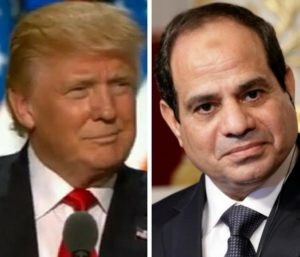by WorldTribune Staff, February 23, 2017
After six years of getting the cold shoulder from former President Barack Obama, Egypt is hopeful of restoring ties with the U.S. under the Trump administration and ultimately returning to its traditional role as a central Arab power.
A former ambassador to Egypt, speaking to a visiting private U.S. delegation on Feb. 8 at the Egyptian Council on Foreign Affairs, said that the U.S. should realize that “we are a force of stability and an anchor [of stability in the region].”

Cairo could play a role in regional security frameworks, sometimes dubbed “Arab NATO,” that could confront Iran and other terror threats, according to a Feb. 22 report by Jerusalem Post op-ed editor Seth J. Frantzman for National Review.
Concerned about Iranian influence in Baghdad, Damascus, and Beirut, Cairo “is trying to navigate between that and its fears of the instability, in Syria and elsewhere, that has fueled ISIS and Islamist extremism generally.”
“After six years of uncertainty and a rocky relationship with the U.S., many Egyptians seem open to new faces in Washington. After the visit by CIA director Mike Pompeo to Turkey and by defense secretary James Mattis to the United Arab Emirates, Egyptians are watching closely for signals that might indicate where Cairo stands in Trump’s foreign policy,” Frantzman wrote.
Dalia Ziada, executive director of the Liberal Democracy Institute of Egypt, told National Review she was initially excited about relations with the U.S. under Obama and even attended his 2009 Cairo speech. “We were shouting ‘I love you.’ But now when he left [office], no one is happy with him — he supported the [Muslim] Brotherhood and took sides against Egypt in its darkest moment.”
During Obama’s tenure, Egyptian President Abdul Fatah Sisi “received the cold shoulder in Washington,” the National Review report noted, adding that analysts such as Michele Dunne at the Carnegie Endowment for International Peace argued against “unqualified support” for his government. These attitudes, along with a 2015 visit by Muslim Brotherhood figures to Washington, was interpreted in Cairo as continued support by Obama for the Brotherhood, the report said.
Cairo today has quietly welcomed Ted Cruz’s introduction of a bill in Congress to designate the Muslim Brotherhood a foreign terrorist organization. Egypt has its own law banning the organization.
Andrea Zaki Stephanous, president of the Protestant Churches of Egypt, said that his community and others are looking forward to the new government in the U.S. “I don’t want to enter into the issue of pro-Trump or against, but regardless my country is optimistic [about] the relationship with the U.S. and the new administration… It is not only military but goes beyond that, including economic aid.”
Egypt is hoping that warmer relations with the U.S., which will include economic aid, will help Cairo turn the corner after inflation reached 30 percent January, the Egyptian pound was near historic lows and the vital tourism industry suffered an 80 percent decline since 2010.
A $12 billion loan from the International Monetary Fund was secured last November.
